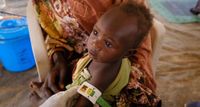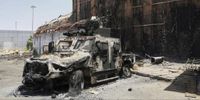As the devastating civil war in Sudan marks its second anniversary, international calls for a ceasefire and humanitarian aid have intensified. Countries including the UK, Germany, and France have joined forces to demand an end to the bloodshed and to highlight the urgent need for humanitarian assistance for millions affected by the conflict. During a recent conference held in London, these nations emphasized the necessity of achieving an immediate and lasting ceasefire to end the ongoing violence that has plagued the region.
According to the host nations of the conference, the priority must be to establish a ceasefire and prevent the division of the country. This sentiment echoes the growing concern over the humanitarian crisis, which has escalated to alarming levels. The British government announced that eight participating countries reaffirmed their commitments to provide aid, pledging a total of 813 million pounds (approximately 953 million euros) for Sudan and its neighboring countries in 2025.
Germany has taken a significant step by pledging 125 million euros in support for Sudan and its neighbors, as stated by Foreign Minister Annalena Baerbock. She warned that the consequences of the civil war should not be overlooked, noting that it is frequently referred to as a "forgotten crisis" in European media. The ongoing conflict has resulted in widespread violence, sexual assault, killings, and mass displacement.
The fighting, primarily between government troops and the Rapid Support Forces (RSF) militia, has led to what humanitarian workers describe as the world’s largest humanitarian crisis. Millions are displaced and face acute hunger, with reports indicating that tens of thousands have lost their lives since the conflict began. The UN estimates that 13 million people are currently on the run, while the EU places the number of displaced individuals at around 15 million. The situation has deteriorated further due to significant cuts in international aid, leaving many without the necessary support.
At the London conference, Baerbock urged the warring parties to return to the negotiation table, stressing that all external actors must contribute to a peaceful resolution. The international community's role is critical, especially since both the Sudanese army and the RSF receive foreign support. The International Crisis Group (ICG) has reported that the Sudanese army is backed by arms and political support from several Arab states, particularly Egypt, while the RSF has found backing mainly in the United Arab Emirates.
UN Secretary-General António Guterres also expressed his deep concerns regarding the ongoing influx of weapons and fighters into Sudan, condemning the external support for the conflicting parties. He highlighted the urgent need for a concerted effort to halt the violence and restore peace.
The humanitarian crisis in Sudan has not only affected the local population but has also had far-reaching implications for neighboring countries. Chad has become a refuge for nearly one million Sudanese fleeing the violence, while 1.5 million have sought safety in Egypt. Many South Sudanese, once refugees themselves, have returned to their homeland only to find it on the brink of war once again.
Filippo Grandi, the UN High Commissioner for Refugees, has described the situation as a catastrophic displacement disaster. He emphasized that the people of Sudan are trapped in a cycle of war, neglect, and flight, facing daily bombardments and severe human rights violations. Grandi noted that the world has largely turned a blind eye to the plight of those suffering in Sudan, and the international community must take action to address the situation.
Reports of brutal attacks on vulnerable populations in North Darfur have surfaced in recent days, further compounding the crisis. Humanitarian workers have also been targeted, resulting in casualties among those trying to provide aid. The situation has reached a point where humanitarian supplies are dwindling, and shelters are inadequate for the influx of refugees.
Grandi called for immediate humanitarian and developmental support to help both refugees and the local communities that host them. He stressed the need for investment in peace, prosperity, and stability, warning that ignoring the crisis will have catastrophic consequences not only for Sudan but for the entire region.
As the world marks two years of conflict in Sudan, the urgency for action is clear. The international community must not only provide immediate humanitarian aid but also work towards a sustainable solution that ensures the safety and dignity of those affected. The consequences of inaction could lead to an even greater humanitarian disaster, as Sudanese refugees continue to seek safety in neighboring countries and beyond.






